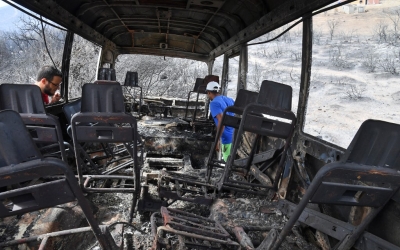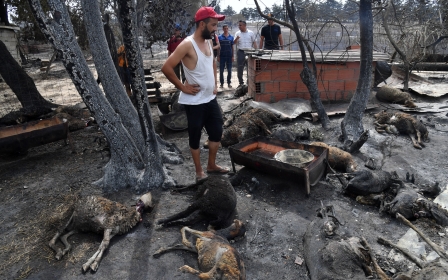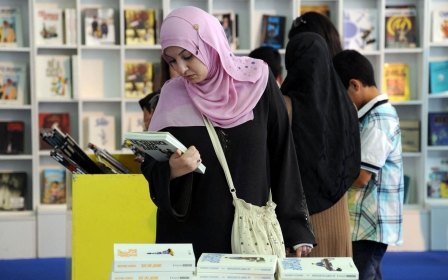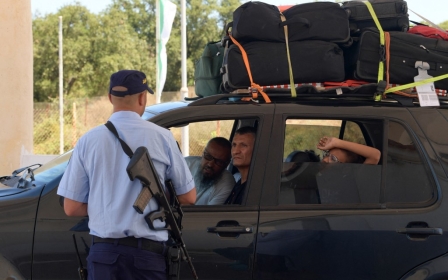Algeria wildfires: Diaspora in France desperate to help
Since the start of the wildfires in eastern Algeria in mid-August, Dr Nesrine Meharzi, a biotechnology and oncology researcher of Algerian origin working in Paris, has mobilised efforts on the internet and by phone to organise the sending of disaster relief to victims.
On the Facebook account of her association, the Algerian Medical Network (AMN), the posts reflect the urgency of the situation and identify the needs, especially in medicines for the treatment of severe burns.
'People are constantly contacting us, almost harassing us, to find out how they can help'
- Nesrine Meharzi, Algerian Medical Network
AMN uses social networks to ask Algerian associations based in Paris and other regions of France to provide logistical assistance for the centralisation of donations before their transport to Algeria.
Some, like Algerian solidarity group ASFA, which has been very active in Strasbourg for 25 years, or HelloMed Algeria, an association founded by expatriate pharmacy students, are themselves used to delivering aid to Algeria. They particularly stood out last summer during the outbreak of Covid-19 and the fires that engulfed the north-east of the country, particularly the Kabylie region.
AMN has become known to the public since then. Established in 2020, when the first wave of Covid reached Algeria, it acquired great fame after succeeding in raising 640,000 euros for the purchase of oxygen concentrators and medicines for those affected by the virus.
New MEE newsletter: Jerusalem Dispatch
Sign up to get the latest insights and analysis on Israel-Palestine, alongside Turkey Unpacked and other MEE newsletters
In addition to occasional material aid, the network has around 300 practitioners working on both sides of the Mediterranean, who help each other to better meet the demand for care in times of crisis.
It is also thanks to a doctor coordinating the network of volunteers in Annaba, a city affected by the fires, that AMN was able to find out what was missing to treat the victims. "We went to get the information at the source, which allowed us to list the needs," Meharzi told Middle East Eye.
For donations, the network does not have to worry. It is already overwhelmed with grants. “People are constantly contacting us, almost harassing us, to find out how they can help,” Meharzi added.
Import regulations
Linda Djebari is an Algerian from Paris. Part of her family lives in El Tarf, an area near the border with Tunisia where the recent fires were particularly deadly, with around 30 deaths and hundreds injured. She mobilised her own friends to buy medicine, food, and collect clothes for the victims.
"I already have so many boxes but I don't know how to send them," she told MEE.
According to Meharzi, the first collection points have been organised and should open very soon. However, she asked donors to comply with the list of medicines she published on Facebook, including those necessary in case of burns, because the Algerian state imposes a ban on the imports of certain products, mainly to support national production.
“Last year, like many associations, we were unable to send everything we collected due to administrative formalities. The Algerian Ministry of the Pharmaceutical Industry has a well-defined list of medicines authorised for entry into the country,” said the head of AMN, who also contacted the embassy in Paris to request the free transfer of donations through the national airline company Air Algerie.
"Everything must be the subject of official permits," she said, arguing that it is necessary to break down bureaucratic barriers in exceptional and urgent contexts.
Jugurta Ayad, president of the Association of Algerians (ADDRA), also calls for a relaxation of the regulations. During the Covid crisis last summer, his association faced difficulty in sending help because of the "administrative headache" and the cost of the transfer.
Members of ADDRA had to carry oxygen concentrators themselves, which they then transferred from one patient to another.
Aid for reforestation
After the fires of August 2019, Ayad returned to Algeria to participate with local associations in the reforestation of the burned regions. "We spent around 6,000 euros to buy the trees for the benefit of nine hard-hit villages," he told MEE.
While the fires have just been brought under control in eastern Algeria, the civil society activist is already thinking of other plantations.
"With the help of our acquaintances on the spot, we made contact with three nurseries, in Boumerdes, Bejaia and Annaba, to supply us with trees," he said.
Djebari, who spent all her youth in El Tarf, has been plagued by painful nostalgia since she saw videos on the internet of the large natural park, classified as a biosphere reserve by Unesco, in flames. “I feel sorry for this beautiful site where we once picnicked as a family,” she says.
'I feel sorry for this beautiful site where we once picnicked as a family'
- Linda Djebari, Algerian in France
For Nadia Maatouk, a student in Toulouse in the south of France, the images above all revive the memory of her cousin, a victim of the fires in Kabylie in 2021, after an agony which had lasted almost a month.
“She had been evacuated with other serious burn victims very late in Turkey. It was there that she passed away,” said the young woman, who denounced irresponsible management of the disaster by the authorities.
“Why were the patients not quickly transferred to France, for example? We have plenty of Algerian doctors here who could have helped to organise care,” she said angrily, because relatives of victims had to denounce the lack of resources in Algerian hospitals for patients to be treated, transferred, at government expense, to an American hospital in Turkey.
The AMN network includes practitioners specialising in the treatment of severe burns. “One of them is a doctor at the Montpellier University Hospital Centre,” notes Meharzi.
She would like the authorities to establish lasting links with Algerian doctors abroad in order to be able to call on them in emergency situations.
“The medical profession of the diaspora is really concerned by what is happening in the country. There is a real desire to help,” she stressed.
*This article was first published in French
Middle East Eye delivers independent and unrivalled coverage and analysis of the Middle East, North Africa and beyond. To learn more about republishing this content and the associated fees, please fill out this form. More about MEE can be found here.





